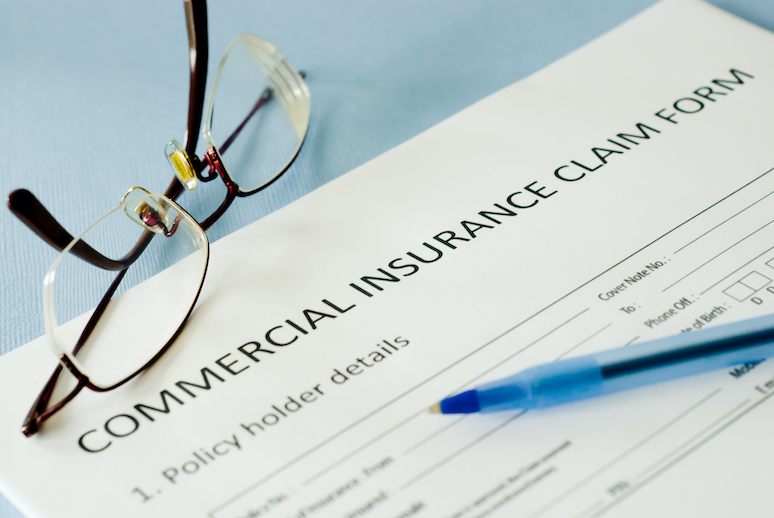Florida Commercial Insurance Claims
Running a business in Florida can be very challenging. Every decision you make can significantly impact your business, including choosing the right business insurance.
You don’t have to go through the process alone. At Florida Home Claim, P.A., we can guide you through all your options to ensure that your Florida business is completely protected.
With almost 9 million workers, Florida is the 4th largest labor force in the United States. While commercial insurance is not mandatory if you operate a business, if you own assets or property, you should consider investing in professional liability insurance to protect your Florida business.
Business insurance protects businesses from devastating financial losses caused by property damage, income loss, theft, fire, vandalism, and lawsuits.

What is Commercial Insurance?
Commercial insurance is essentially a contract your business makes with an insurance company. You pay monthly premiums on time, and your insurer repairs or recovers the value of anything lost or damaged by any number of events.
At Florida Home Claim, P.A., we can help you establish the right commercial insurance in Florida to protect you, your employees, and your business.
Why do I Need Commercial Insurance?
No matter how big or small your business is, you will need some type of insurance coverage. While some forms of coverage may not apply to your particular business, one small error could make it impossible for you to recover financially. It’s better to spend some money every month for coverage than to be at risk for financial ruin.
Many things could happen to your business, from theft to damage to your property or equipment to bodily injury to your staff or customers to natural disasters.
What Does Commercial Insurance Cover?
All businesses are unique, which means they may face different risks. To protect your business, it’s essential to understand what the best kind of coverage would benefit it.
General commercial insurance can cover the following:
- Property insurance covers damage to your equipment and building due to storms, fires, and more
- General liability covers personal injury
- Professional liability covers negligence, copyright infringements, injury, and more
- Commercial auto insurance covers damage to work vehicles
- Cyber-crime insurance covers sensitive data breaches
- Employer insurance covers workers compensation insurance, unemployment, Social Security, and more

What is Business Owner’s Policy?
BOP, or Business Owner’s Policy, helpfully combines various coverages into a singular insurance policy that protects you from claims for incidents like theft, fire, storms, and other disasters.
BOP helps protect you from bodily injury claims, advertising injury, and property damage.
Business Interruption Coverage
Business interruption coverage is generally a part of your BOP. This portion of your coverage replaces lost income and additional financial expenses if your business has been impacted by an event that is covered.
An example would be a fire that destroys your office and makes it unfit for work. Your business interruption coverage would allow you to temporarily rent another office during repairs and reconstruction by covering these unexpected costs.
Business Insurance Vs. Commercial Insurance
As a Florida business owner looking to purchase the best insurance policy, it can be confusing when looking at commercial insurance and business insurance. Business owners may think that business insurance is only for small businesses, while commercial insurance is required for corporations. Even though they are very different, they tend to be used interchangeably.
When considering Florida business insurance, your insurance company should help you determine the best coverage to protect you. Small business owners can bundle the types of commercial insurance coverage that fit their budget, from workers’ compensation, commercial auto coverage, professional liability insurance, business interruption insurance, property coverage, and more.
Commercial Auto Insurance
Commercial auto insurance helps business owners by covering motor vehicles used for work, like cars, vans, food trucks, service utility trucks, box trucks, and pickup trucks—commercial auto insurance guards against car damage and injuries to passengers and drivers.
If your Florida business utilizes cars as part of your business model, ensure that your insurance company can protect you. Whether your business is small or large, you should always consider a customized policy that covers you.
Commercial car insurance covers things like:
- Car damage
- Injured driver
- Injured passengers
- Property damage
What is Liability Insurance?
General liability insurance is a very common category of small business insurance coverage.
General liability covers you if a customer hurts themselves in your business. For example, if they accidentally fall while walking on your sidewalk or in your business location.
No matter if you are at fault for the accident, your general liability insurance will protect you and your finances. If you are found to be at fault, your liability insurance should cover the damage and any medical bills up to your policy limit.
Every business owner in Florida should protect themselves by carrying liability insurance.
Florida Workers’ Compensation Insurance
Florida state law requires any employer with four or more employees to supply workers’ compensation insurance for their employees, whether full- or part-time.
Workers’ compensation insurance protects business owners and their workers from incidents like car accidents, slip-and-falls, and other workplace-related injuries.
Workers’ compensation insurance can cover your business by:
- Covering medical care
- Replace your employees lost wages if they need time to recover
- Offer disability benefits
- Cover funeral costs in the event of a death
Workers’ compensation insurance also provides benefits to the business owner in the event that an injured employee or their loved ones sue your company.
Differences Between Types of Insurance Coverage
In order to be a successful small business owner, you need to consider protection from liability and property claims. Many business owners procure general liability through a Business Owner’s Policy, which combines business income and commercial property with general liability coverage.
General liability insurance will cover you from bodily injury or property damage claims, as well as advertising injury lawsuits.
Commercial property insurance protects your physical business and equipment, no matter if you own or lease.
Professional liability insurance restores any lost income if you temporarily close your business, for example, because of fire damage. Business income coverage can also protect you from absent employees. It also covers you and your Florida business if your professional services have been found negligent.
If you own a Florida business, it may be in your best interest to bundle different kinds of coverage or to add extra coverage.

Why Do Small Business Owners Need Coverage?
Small businesses come up against various risks, and, more often than not, they are better off being insured. If you are the owner of a Florida business, you are already aware of how much work it takes to operate a business successfully.
Even with all the planning in the world, there will always be incidents that you did not anticipate. Would your business survive fire damage, vandalism, a professional error, or more?
Getting insurance for your small business means protecting yourself and your employees. It should always be there if something catastrophic happens to your business.
What if Your Insurance Company Denies your Commercial Insurance Claim?
When you invest in Florida business insurance, you protect your intellectual property, financial assets, and physical location from events that could cause severe economic losses.
Your business insurance should insure your business against employee injury, vandalism, natural disasters, workplace accidents, car accidents, and death.
Without coverage, any of these events could make it difficult to continue operating your business. You may need to close down your business, which is why your insurance company is essential for paying your losses.
When you file a business insurance claim, you are entitled to the coverage that your policy stipulates. When you file your Florida business insurance claim, your insurance company sets out to gather evidence and investigate.
If your insurance company refuses to compensate your legitimate claim, they can be sued in civil court. Insurance is a contract between the policyholder and the insurer, and if the insurance company fails to uphold their end, they are in breach of contract. Additionally, in the state of Florida, policyholders can sue for bad faith rejection of insurance claims.
Bad faith denials occur when the insurer fails to gather or acknowledge evidence, refuses to investigate, fails to communicate promptly with the policyholder, or otherwise delays any attempt to collect financial compensation. A tort claim can permit the policyholder to seek punitive damages, which are often more than the policy itself.
Contact Your Florida Commercial Insurance Claims Attorney
Commercial insurance claims rejections and denials raise multiple concerns regarding your insurance coverage and your options for litigation.
If your workers’ compensation, commercial auto, professional liability, or other insurance claims have been denied, a bad faith insurance attorney can help you determine the next best steps.
The unfortunate reality is that many insurance companies deny claims. At Florida Home Claim, P.A., we can advocate for you if you are fighting to get compensation. Navigating a denied or underpaid claim alone can be confusing and frustrating, but you don’t have to do it alone. If your insurance company refuses to change its denial of coverage, you may have to consider litigation as your only recourse.
You may have grounds for a lawsuit in order to get the commercial insurance coverage you paid for. To begin the litigation process, you should contact professionals who specialize in commercial insurance law.